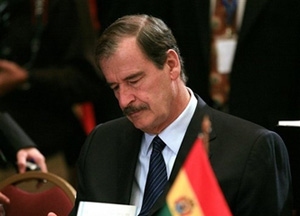 |
 |
 |
 Editorials | December 2006 Editorials | December 2006  
Why President Fox Failed
 Martin Walker - UPI Martin Walker - UPI


| | President Fox, candidate of the "Alliance for Change," made minimal changes to the country despite his expectations-filled victory in July 2000. |
As the new president of Mexico, Felipe Calderon, begins his term, one unresolved question from the past remains. Why did Mexico under his predecessor, Vicente Fox, reach a turning point at which history failed to turn?

President Fox, candidate of the "Alliance for Change," made minimal changes to the country despite his expectations-filled victory in July 2000. But Mexican insiders tell United Press International that one key sign that Fox was not ready to reform came shortly after his unexpected electoral victory when he appointed several officials of the old regime he defeated to his transition team and his government, especially to the federal police agencies and the presidential offices.

In all, Fox appointed only 78 members of his own party, the conservative PAN, to the entire federal government during his first year. He also discarded other allies such as the Green Party, renegade leftist activists, as well as others from the civil society that mobilized to put an end to Mexico's 71 years of one-party rule by the PRI, the intriguingly-named Party of the Institutionalized Revolution.

While analysts have speculated the reasons for this "co-optation," as writer Lorenzo Meyer labeled it back in 2001, there has been little in the way of concrete explanations. Was he threatened? Was he paid off? Some speculated that is was his innocence and good will that led him to "seek social peace" by making as few changes as possible. But Sergio Aguayo, an academic specializing on the Mexican political police, criticized Fox in 2001 for his "suicidal policy of appeasing the worst of the former regime."

Now, information from Fox's former close associates is emerging that can help answer some of these questions.

Felipe Zavala was one of the closest confidantes to Fox, serving as his personal secretary since 1991. Staying with Fox throughout the campaign and appearing next to the candidate at virtually every rally and event, Zavala just after the electoral victory was elbowed out of President Fox's inner circle by PRI officials brought in to run Fox's presidential office, and has been working at the Agriculture Secretariat since. Zavala recently declared that as presidential candidate in 1999 and 2000, Fox met privately several times with former President Luis Echeverría (1970-76).

"I would wait outside, but they would speak alone for hours each time," Zavala now reveals.

Zavala mentioned that Fox met about 15 times with Echeverría, mostly at the latter's home in Mexico City. Fox even had a sympathetic nickname for the former president, "El Huichol," which he would use as a code over the telephone when arranging their meetings.

While a presidential candidate meeting a former president in most countries would not raise eyebrows, in Mexico this has serious implications. Echeverría is widely criticized as the architect of Mexico's "dirty war," massive corruption, economic meltdowns, as well as the wielding of power behind the throne long after his term expired.

Some have speculated that Echeverría's control of the various federal police and spy agencies since he was interior minister in the late 1960s is the source of his extra-constitutional power inside the PRI. Among them is former President Carlos Salinas (1988-94), who publicly declared this in 1995 after several of his top political allies were murdered or jailed. Echeverría's ties to drug cartels have long been suspected, and his brother-in-law, Rubén Zuno Arce, is serving a life sentence in the United States since 1992 for the drug-trade-related murder of an agent of the U.S. Drug Enforcement Administration and his pilot. In that ruling, the California court determined that Zuno Arce was a member of the Guadalajara drug cartel.

Fox was widely seen as the best hope for ending these legacies of Mexican politics. A former Coca-Cola executive and gentleman rancher, Fox led a bare-knuckled fight against the PRI since joining the long-time opposition party PAN in 1988, famously mocking Salinas from the Congress. Fox became the candidate of the PAN (in coalition with the Greens) in 1999 and defeated the PRI candidate, the former Salinas loyalist Francisco Labastida, in July 2, 2000.

Mexican analysts suggest that for Fox to have held regular clandestine meetings with Echeverría would be the equivalent of discovering that Ronald Reagan did the same with Soviet officials during his campaign in 1980.

Echeverria is hated by Mexico's left, who have sought to bring genocide charges against him as the minister of the interior responsible for the 1968 Olympic Games massacre of students and other protestors near downtown Mexico City. The Right in Mexico blames Echeverría for an economic disaster whose effects are still felt. When Echeverria took office, the Mexican peso was trading at just over 12 to the dollar and there was little foreign debt. He sharply increased indebtedness and eventually the peso collapsed to about one-thousandth of its 1970 exchange rate, wiping out the savings of the middle classes.

Another sign of a possible "understanding" between Fox and Echeverría comes from an appointment Fox made to the Public Security Secretariat, the main ministry with police and investigative functions. To head it, the then president-elect appointed Alejandro Gertz Manero, an academic and former head of the Mexico City police department. Gertz had also been at the center of a long-forgotten scandal in 1972 as he, accompanied by six armed officers, attempted to confiscate archeological artifacts from the owner of a small museum in the city of San Miguel de Allende. | 
 | |
 |



